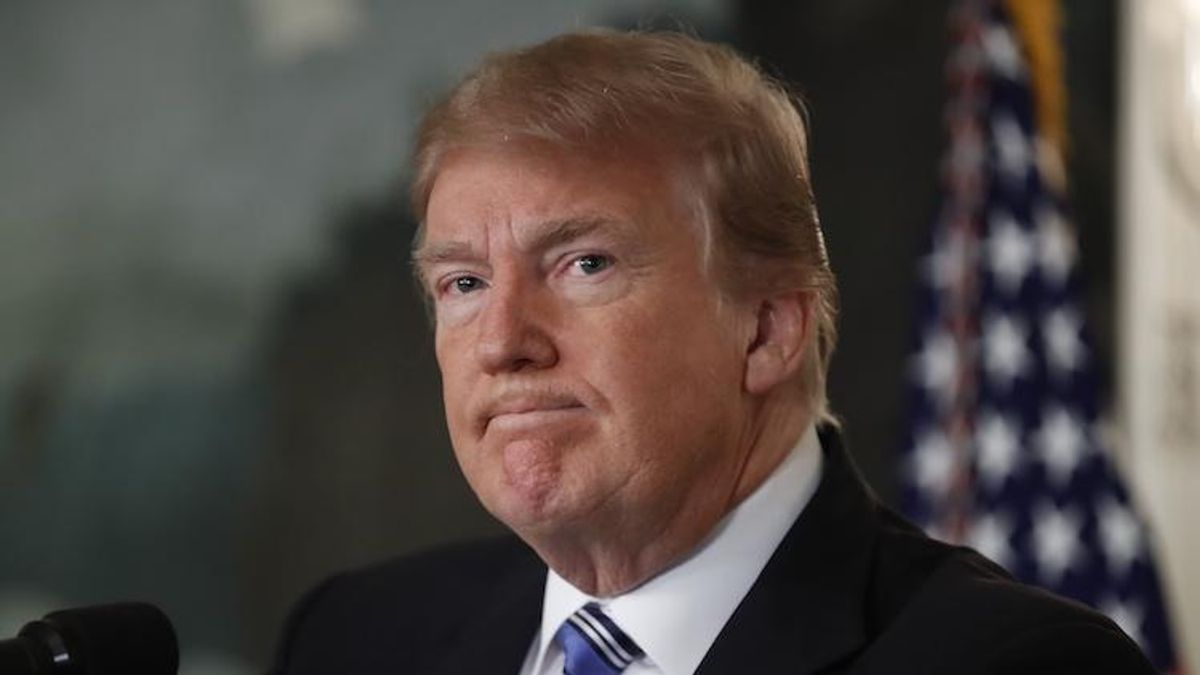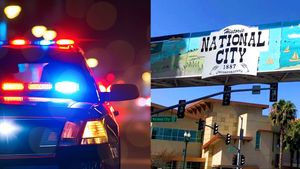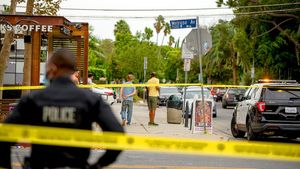On Wednesday, a 19-year-old gunman killed 17 people at Marjory Stoneman Douglas High School in Parkland, Florida. He used an AR-15 rifle--the same kind used in the Pulse nightclub massacre two years ago--that he legally purchased despite a long history of mental health issues.
As with every other mass shooting in America, this one has been met with the same cyclical response. While American citizens and many lawmakers call for gun control, some politicians like Florida's Marco Rubio have asked to not politicize the tragedy, while failing to note the millions of dollars in campaign contributions they receive from the National Rifle Association.
The reality we are facing as we mourn this senseless loss of life is the fact that mass shootings have somehow become as American as apple pie and baseball. The Florida massacre was the 18th school shooting in 2018--and we're less than 50 days into the year. That's more than twice as many as this time last year and, at one point last year, there were more mass shootings than there were days of the year. Frankly, this kind of mass loss of life and negligent response is insanity.
This is at least the 273rd school shooting since 20 first-graders and six adults were slaughtered in Newtown, Connecticut. It was in the aftermath of that tragedy that Rubio tweeted that he was praying for Newtown, and there would be "plenty of time for policy debate later."
Now, in the wake of this one in Florida, he said that "I think it's important to know all of that before you jump to conclusions that there's some law that we could have passed that could have prevented it." This line of thought is outdated, dangerous, and covers up the overwhelming resistance to gun control measures under the Trump administration.
According toThe Washington Post, Democrats have introduced more than 30 pieces of legislation aimed at combatting gun violence in the past year. Only four have had GOP sponsors. While some GOP senators have expressed an interest in fixing some gaps in existing law, it has been President Trump and other Republicans who have launched several efforts to loosen gun-control laws.
In an effort to jog your memory and give you talking points as you call up your senators to demand gun control legislation once again, here are all the ways Washington has blocked gun control laws since Trump took office.
Trump Blocked a Rule That Would've Made It Harder for the Mentally Ill to Buy Guns
In December 2016, Obama finalized a rule that would've added people who received Social Security checks for mental illness and people deemed unfit to handle their own finances to the FBI's National Instant Criminal Background Check System (NICS). It would've added 75,000 people to the database but was blocked after the NRA and the ACLU accused the law of violating the Second Amendment rights of the mentally ill without due process.
Congress overturned it and President Trump signed the measure into law in February 2017, yet he has continued to say mass shootings are a "mental-health problem" rather than a gun problem.
Trump Made It Easier for "Fugitives" to Buy Guns
In the 1993 Brady Act--which mandated federal background checks on gun purchases--gun dealers were not allowed to complete the sale of a firearm if the prospective buyer was a "fugitive from justice." This definition was disputed for years and the Bureau of Alcohol, Tobacco, Firearms, and Explosives said that it only applied to people with outstanding warrants "who have fled across state lines to avoid prosecution."
A year ago, Trump's Justice Department sided with this definition and purged about 500,000 people previously labeled "fugitives" from the system.
The GOP Loosened Gun Restrictions on Federal Lands
With the exception of specified areas that allow for hunting and target shooting, loaded firearms were banned from the roughly 12 million acres of federal lands controlled by the Army Corps of Engineers. In March, the Corps stated that it's reconsidering this policy.
In another example of loosening restrictions, Interior Secretary Ryan Zinke revoked a ban on using lead ammunition on wildlife refuges on his first date in office. This ban had been enacted to protect plants and animals from lead poisoning from bullets left on federal lands.
Republicans Moved Forward with a Bill to Make It Easier to Buy Gun Silencers
A bill that would've loosened restrictions on buying gun silencers was originally set to get a hearing on June 14, 2017, but has been ironically delayed twice because of shootings. The first delay came when a gunman opened fire on members of Congress practicing for a charity baseball game and was delayed again after the Las Vegas massacre that killed 59 people in October.
The bill is expected to pass eventually and would also make it harder for the ATF to classify ammunition as "armor piercing."
Congress Talked About Banning Bump Stocks, But Hasn't Passed Anything
A "bump stock" makes a legal semiautomatic firearm function like an illegal automatic weapon, and was used in the Las Vegas shooting. In the aftermath of that shooting, Democratic Senator Dianne Feinstein introduced a bill that would ban the devices and a handful of Republican Senators joined her in calling for a ban.
So far, nothing has passed. While Congress debates endlessly on the issue, at least 15 states and other municipalities began to consider their own bump-stock restrictions, and New Jersey and Massachusetts have already enacted new laws banning bump stocks.
House Speaker Paul Ryan Ignored Calls for Him to Form a Select Committee on Gun Violence
After the Las Vegas shooting, Democratic House Minority Leader Nancy Pelosi called for Speaker Paul Ryan to create a Select Committee on Gun Violence that would "study and report back common sense legislation" to stop mass shootings and take up a bipartisan bill that would establish mandatory background checks. He did not respond.
Then, two days after 26 people were killed in a Texas church shooting on November 5, Democrats attempted to force a vote on the creation of a gun-violence select committee. This effort was met with absolutely no Republican support.
The House of Representatives Passed a Bill Allowing Concealed Carry Permits to Work Across State Lines
In the Texas church shooting, the gunman was someone who had been kicked out of the military for domestic assault. This should have prevented him from purchasing a semiautomatic rifle, but the Air Force admitted days after the shooting that they had failed to submit his records to the federal database.
In response to this, Democratic Senator Chris Murphy and Republican Senator John Cornyn introduced the Fix NICS Act, which would improve the reporting of criminal records and domestic-violence data to the FBI. This bill seemed likely to pass until it was tacked on to the Concealed Carry Reciprocity Act. That bill would allow people granted a concealed-carry license in their state to conceal a weapon anywhere in the country-- completely overruling other states' gun laws. That bill passed by a vote of 231-198 in December, mostly on partisan lines, but is expected to be dead on arrival in the Senate unless these bills are separated.
Trump Proposed Cutting Millions in Funding For the Background-Check System
Two days before the Florida shooting, Trump released his fiscal year 2019 budget, which calls for reduced funding for the National Criminal Records History Improvement Program and the NICS Act Record Improvement Program. They give states federal grants to improve reporting to the national background-check database. In the budget, their funding would be cut from $73 million to $61 million, which is a 16 percent reduction.

























































































Did 'The White Lotus' waste Lisa's acting debut?